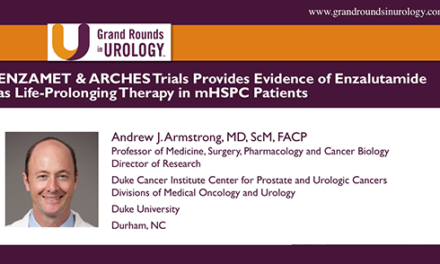Brian T. Helfand, MD, PhD, presented “Next Generation Imaging for Localization of Recurrent Prostate Cancer” during the 31st International Prostate Cancer Update in July 2021 in Snowbird, Utah.
How to cite: Helfand, Brian T. “Next Generation Imaging for Localization of Recurrent Prostate Cancer.” July 2021. Accessed Nov 2025. https://grandroundsinurology.com/next-generation-imaging-for-localization-of-recurrent-prostate-cancer/
Next Generation Imaging for Localization of Recurrent Prostate Cancer – Summary
Brian T. Helfand, MD, PhD, Chief of the Division of Urology and the Ronald L. Chez Family and Richard Melman Family Endowed Chair at NorthShore University HealthSystem in Evanston, Illinois, discusses the efficacy of next generation imaging options for localization of recurrent prostate cancer. He states that conventional imaging is consistently lacking in the sensitivity necessary to localize recurrence in patients with PSA levels below 10 ng/ml and that waiting for PSA levels to become this high produces worse oncologic outcomes in patients. Dr. Helfand suggests that next generation imaging is superior to conventional imaging due to the ability of MRI and PET CT scans to produce more accurate results at lower PSA levels. He then looks at the different available next generation imaging agents, focusing on choline C-11, fluciclovine, gallium, and DCFPyl, and expresses a need to understand how these agents compare to one another. Dr. Helfand reviews data on choline C-11 PET imaging which shows positive scans in 36% of patients at PSA levels below 1 ng/ml. He then discusses data from the LOCATE trial showing a 30% detection rate at 0 to 0.5 ng/ml, and evidence of PSMA having a 57.89% detection rate at 0.2 to 0.5 ng/ml. Dr. Helfand shows comparative data of the agents wherein PSMA has a better detection rate than choline C-11 of 86% vs. 70%, respectively, and a better detection rate than fluciclovine of 80% vs. 62%, respectively. He concludes that all next generation imaging options are superior to conventional imaging but more data is needed on how they improve oncological outcomes and on situational use of imaging agents.
About The 31st Annual International Prostate Cancer Update:
The International Prostate Cancer Update (IPCU), founded in 1990, is a multi-day CME conference focused on prostate cancer treatment updates with expert, international faculty. It is led by expert physicians and is designed for urologists, medical oncologists, radiation oncologists, and other healthcare professionals involved in the diagnosis and treatment of prostate cancer. Dr. Helfand delivered this educational activity during the 31st iteration of the meeting in July 2021 in Snowbird, Utah.
ABOUT THE AUTHOR
Brian T. Helfand, MD, PhD, is Chief of the Division of Urology and the Ronald L. Chez Family and Richard Melman Family Endowed Chair at NorthShore University HealthSystem. He is Director of the Personalized Prostate Program and Director of Clinical Research in the Program for Personalized Cancer Care (PPCC). He is also an active surgical scientist who is involved in the care of patients with prostate cancer. His clinical care and research is focused on the implementation of genetic tests and biomarker studies for prostate cancer.
Dr. Helfand completed his undergraduate degree at Emory University. He received his medical training and PhD in Cell and Molecular Biology and Genetics from Northwestern University. He is a fellowship-trained urologic oncologist who has focused his research career on prostate cancer. He was recruited in 2011 from Northwestern University’s Feinberg School of Medicine, where he was faculty in the Department of Urology. Dr. Helfand is an internationally-known urologist and genomic translational researcher. He has received multiple grants from the NIH and has published over 140 peer-reviewed manuscripts in journals such as Nature Genetics, The Journal of Cell Biology, and Science Translational Medicine.
Dr. Helfand is involved in national and international research collaborations as an active member of the International Consortium for Prostate Cancer Genetics (ICPCG), the Prostate Cancer Specialized Program of Research Excellence (SPORE), the IMPACT) study, and the Lower Urinary Tract Dysfunction Research Network (LURN). His current research goals are focused on germline genetic variations and mutations. He is determined to use this information to assist in personal and informed clinical decision making about prostate cancer screening and treatment for patients and their family members.




